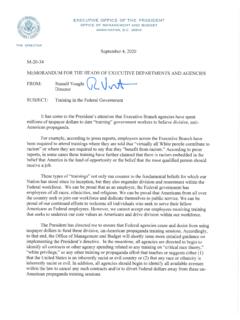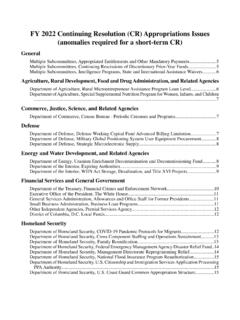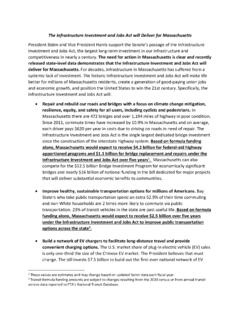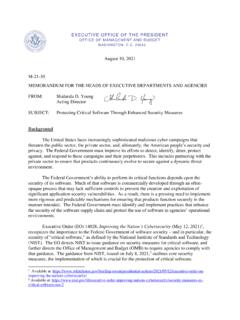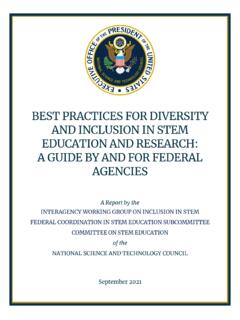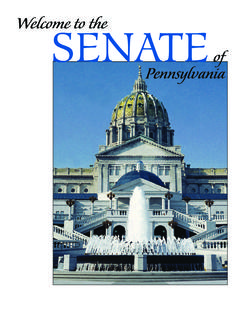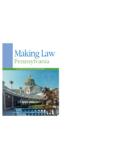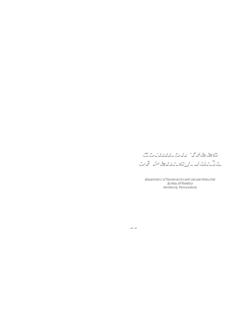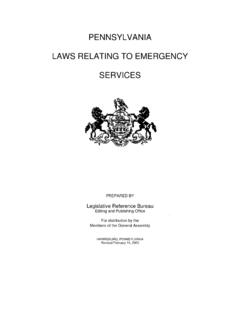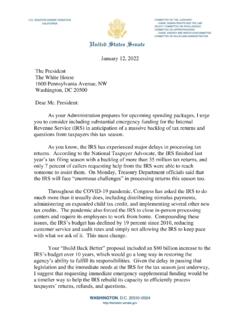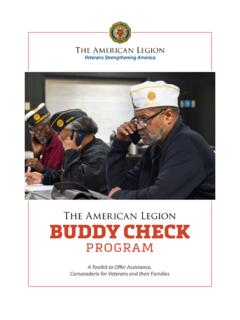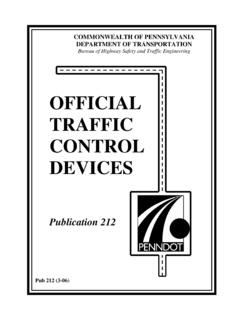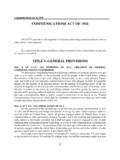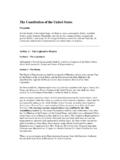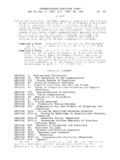Transcription of DRAFT FINAL REPORT
1 Presidential Commission on the Supreme Court of the United States DRAFT FINAL REPORT December 2021 Presidential Commission on the Supreme Court of the United States This page is intentionally left blank. Presidential Commission on the Supreme Court of the United States December 2021 | i Letter to the President [To be added following the December 7th public meeting] Presidential Commission on the Supreme Court of the United States ii | December 2021 This page is intentionally left blank. Presidential Commission on the Supreme Court of the United States December 2021 | iii Table of Contents Letter to the President .. i Preface .. 1 Commission Membership .. 2 Executive Summary .. 6 Acknowledgments .. 11 Introduction: The Genesis of the Reform Debate and the Commission s Mission.
2 12 The Genesis of Today s Reform Debate ..12 Proposals for Reform ..20 Chapter 1: The History of Reforms and Reform Debates .. 34 The Origins of Federal Judicial Power ..34 The Origins of the Supreme Court: The Constitution and the Judiciary Act of 1789 ..36 The Court and Politics in the Early National Period ..39 The Jacksonian Era: National Expansion, Court Expansion, and Partisan Strife ..43 The Upheavals of the Civil War and Reconstruction: Transforming the Constitution ..46 The Progressive Era: Structural Reforms and Democracy-Based Critiques of the Courts ..49 1937, FDR, and the Court: Existential Challenges ..54 The Postwar Period: Brown v. Board of Education and the Warren Court ..57 Conclusion ..59 Chapter 2: Membership and Size of the Court .. 67 A Brief History of Efforts to Alter the Size of the Court.
3 67 The Legality of Court Expansion ..73 Arguments in Support of and Opposition to Court Expansion ..74 Other Structural Reforms ..84 Presidential Commission on the Supreme Court of the United States iv | December 2021 Chapter 3: Term Limits .. 111 The Justifications for Term Limits ..112 Objections to Term Limits ..117 Analyzing a Constitutional Amendment for Term Limits ..122 Enacting Term Limits through Statute ..130 Addressing the Risk of Repeated Confirmation Impasse ..140 Concluding Considerations ..143 Chapter 4: The Court s Role in the Constitutional System .. 152 Proposals to Restrict the Supreme Court s Jurisdiction ..154 Proposals for Supermajority Rules or Deference Rules at the Supreme Court ..169 Proposals to Enable Legislative Overrides of Supreme Court Decisions ..183 Chapter 5: The Supreme Court s Procedures and Practices.
4 202 Emergency Orders ..203 Judicial Ethics ..216 Courtroom Transparency ..225 Appendix A: Executive Order 14023 .. 245 Appendix B: Commission Meetings, Expert Testimony, and Public Comment .. 247 Appendix C: Confirmation Process .. 254 Appendix D: Advocacy Before the Court .. 263 Appendix E: Commission Members .. 275 Presidential Commission on the Supreme Court of the United States December 2021 | 1 Preface Executive Order 14023 established this Presidential Commission on the Supreme Court of the United States. The Order directed the Commission to provide an account of the current debate over the role and operation of the Supreme Court in our constitutional system and an analysis of the principal arguments in the contemporary public debate for and against Supreme Court reform, including an appraisal of the merits and legality of particular reform proposals.
5 Consistent with the Executive Order, the REPORT identifies prominent proposals for reform and provides a critical evaluation of the strengths and weaknesses of the proposals. This appraisal includes consideration of whether specific proposals could reasonably be expected to achieve the objectives that their proponents desire. It also identifies other potential consequences that might result from the reforms, including whether and how they might affect: the critical role of the Court in our system of government, including as a guardian of the rule of law; the protection of constitutional rights, principles, or structures; the processes by which Justices are nominated and confirmed to the Court; and public opinion and perceptions of the Court. The REPORT also analyzes the constitutional and other legal requirements that would have to be met or resolved to implement the reforms.
6 The President made plain in public statements and in his Executive Order that he was seeking a REPORT reflecting bipartisan, diverse perspectives from Commissioners having experience with and knowledge of the Federal judiciary and the Supreme Court of the United States. As would be expected, the Commissioners appointed by the President hold various and sometimes opposing views on the legal and policy issues raised in the Court reform debate, and disagreements are noted at various points in the analysis. The Executive Order does not call for the Commission to issue recommendations, but the REPORT does provide a critical appraisal of arguments in the reform debate. Given the size and nature of the Commission and the complexity of the issues addressed, individual members of the Commission would have written the REPORT with different emphases and approaches.
7 But the Commission submits this REPORT today in the belief that it represents a fair and constructive treatment of the complex and often highly controversial issues it was charged with examining. Presidential Commission on the Supreme Court of the United States 2 | December 2021 Commission MembershipMichelle Adams Professor of Law at Benjamin N. Cardozo School of Law Kate Andrias (Rapporteur) Professor of Law at Columbia Law School Jack Balkin Knight Professor of Constitutional Law and the First Amendment at Yale Law School William Baude Professor of Law and Faculty Director of the Constitutional Law Institute at the University of Chicago Law School Bob Bauer (Co-Chair) Professor of Practice and Distinguished Scholar in Residence at the New York University School of Law and Co-Director of NYU Law s Legislative and Regulatory Process Clinic Elise Boddie Professor of Law, Henry Rutgers Professor, and Judge Robert L.
8 Carter Scholar at Rutgers University Guy-Uriel E. Charles Charles J. Ogletree Jr. Professor of Law at Harvard Law School Andrew Manuel Crespo Morris Wasserstein Public Interest Professor of Law and Executive Faculty Director of the Institute to End Mass Incarceration at Harvard Law School Walter Dellinger Douglas Maggs Emeritus Professor of Law at Duke University and a Partner in the firm of O Melveny & Myers Justin Driver Robert R. Slaughter Professor of Law at Yale Law School Richard Fallon, Jr. Story Professor of Law at Harvard Law School Caroline Fredrickson Distinguished Visiting Professor from Practice at Georgetown Law and a Senior Fellow at the Brennan Center for Justice Heather Gerken Dean and Sol & Lillian Goldman Professor of Law at Yale Law School Nancy Gertner Federal judge (retired), Senior Lecturer (Harvard Law School), attorney at Fick & Marx, and Guttman, Buschner, & Brooks Presidential Commission on the Supreme Court of the United States December 2021 | 3 Thomas B.
9 Griffith Federal judge (retired), attorney at Hunton Andrews Kurth and Lecturer (Harvard Law School) Tara Leigh Grove Charles E. Tweedy, Jr., Endowed Chairholder of Law and Director of the Program in Constitutional Studies at the University of Alabama School of Law Bert I. Huang Michael I. Sovern Professor of Law at Columbia University Sherrilyn Ifill President & Director-Counsel NAACP Legal Defense & Educational Fund, Inc. Olatunde Johnson Jerome B. Sherman Professor of Law at Columbia Law School Michael S. Kang William G. and Virginia K. Karnes Research Professor at Northwestern Pritzker School of Law Alison L. LaCroix Robert Newton Reid Professor of Law at the University of Chicago Law School and Associate Member, Department of History, University of Chicago Margaret H. Lemos Robert G. Seaks 34 Professor of Law, Duke University David F.
10 Levi Levi Family Professor of Law and Judicial Studies and Director of the Bolch Judicial Institute at Duke Law School Trevor W. Morrison Dean and Eric M. & Laurie B. Roth Professor of Law at New York University School of Law Richard H. Pildes Sudler Family Professor of Constitutional Law at New York University School of Law Michael D. Ramsey Hugh and Hazel Darling Foundation Professor of Law at the University of San Diego School of Law Cristina M. Rodr guez (Co-Chair) Leighton Homer Surbeck Professor of Law at Yale Law School Kermit Roosevelt Professor of Law at the University of pennsylvania Carey Law School Bertrall Ross Professor of Law at University of Virginia School of Law David A. Strauss Gerald Ratner Distinguished Service Professor of Law and the Faculty Director of the Supreme Court and Appellate Clinic at the University of Chicago Presidential Commission on the Supreme Court of the United States 4 | December 2021 Laurence H.


